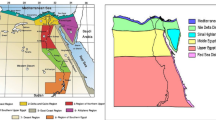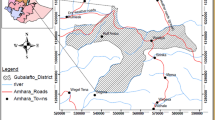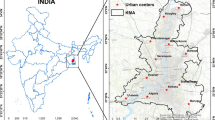Abstract
The Fuzhou district in China is a rapidly changing area with a high population growth and intense land use changes. To analyze the ecological fragility and its causes in the Fuzhou district in China, the ecological fragility was divided into six severity classes based on data from field surveys. The six classes are no fragility, tiny, light, medium, awful and extreme fragility. Using remote sensing and GIS technology, the ecological fragility was assessed spatially explicit and comprehensive, using a pixel size of 30 × 30 m2. The results show that four areas in Fuzhou District are the most fragile, i.e., Pingtan, Minqing County, Changle City and Fuzhou City. The key challenge to improve or retain ecological fragility for these areas is to optimize the land cover present and coordinate the land use within the region.




Similar content being viewed by others
References
Galicia, L., & García-Romero, A. (2007). Land use and land cover change in highland temperate forests in the Izta-Popo National Park, central Mexico. Mountain Research and Development, 27(1), 48–57.
Huang, F., Liu, X.-N., & Zhang, Y.-Z. (2003). GIS-based eco-environmental fragility evaluation in West Jilin province. Scientia Geographica Sinica, 23(1), 95–100. (in Chinese).
Huzui, A. E., Călin, L., & Pătru-Stupariu, I. (2012). Spatial pattern analyses of landscape using multi-temporal data sources. Procedia Environmental Sciences, 14(8), 98–110.
Lube, W., Yuwei, Z., Xinyi, Z., et al. (2015). Comparison of land use/land cover change and landscape patterns in Honghe National Nature Reserve and the surrounding Jiansanjiang Region, China. Ecological Indicators, 51, 205–214.
Qi, P., Shixiong, H., Zhang, H., et al. (2016). Sharpening method of satellite thermal image based on the geographical statistical model. Journal of Applied Remote Sensing, 10(2), 13–17.
Said, G. M. (2013). Modeling of environment fragility of forests fires and assessment by GIS application on the forests of Djelfa (Algeria). Journal of Geographic Information System, 5(1), 24–32.
Song, G., Li, Z., Yang, Y., Semakula, H. M., & Zhang, S. (2015). Assessment of ecological fragility and decision-making application for prioritizing roadside ecological restoration: A method combining geographic information system, Delphi survey and Monte Carlo simulation. Ecological Indication, 52, 57–65.
Yao, X., Yu, K., Liu, J., et al. (2016). Spatial and temporal changes of the ecological fragility in a serious soil erosion area, Southern China. Chinese Journal of Applied Ecology, 27(3), 735–745. (in Chinese).
Yuhai, B., & Jianibin, R. (2011). Wetland landscape classification based on the BP neural network in DaLinor lake area. Procedia Environmental Sciences, 10, 2360–2366.
Zhang, X., He, Y., Fang, C., et al. (2015). Measurement zoning and control of urban eco-environmental fragility. China Environment Science, 35(7), 2200–2208. (in Chinese).
Zhang, F., Li, Y., Liu, S., et al. (2014). Dynamic monitoring of landscape patterns and ecological processes using HJ-1 and SPOT satellite data over Hulunbeier grassland, China. Journal of Earth System Science, 123(2), 319–328.
Acknowledgements
This study was supported by the Social Science Key Project of Universities in Anhui Province in China (SK2016A0995).
Author information
Authors and Affiliations
Corresponding author
Ethics declarations
Conflict of interest
The authors declare that they have no conflict of interest.
About this article
Cite this article
Gao, Y., Zhang, H. The Study of Ecological Environment Fragility Based on Remote Sensing and GIS. J Indian Soc Remote Sens 46, 793–799 (2018). https://doi.org/10.1007/s12524-018-0759-1
Received:
Accepted:
Published:
Issue Date:
DOI: https://doi.org/10.1007/s12524-018-0759-1




